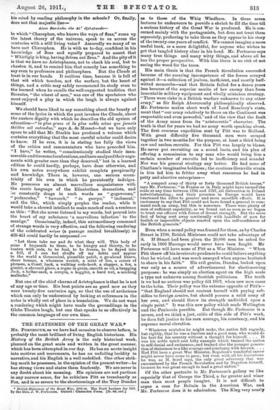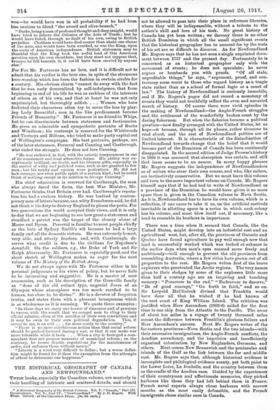THE STATESMEN OF THE GREAT WAR.*
Mn. FOUTESCUE, as we have had occasion to observe before, is probably the most brilliant of living English historians. His History of the British Army is the only historical work, planned on the great scale and written in the great manner, which has been attempted in our day. He has an acute insight into motives and movements, he has an unfailing lucidity in narrative, and his English is a well undefiled. One other strik- ing merit he possesses, in the opinion of the present writer—he has strong views and states them fearlessly. We are never in any doubt about his meaning. His opinions are not partisan in any narrow sense, for he criticizes Pitt as trenchantly as Fox, and is as severe to the shortcomings of the Tory Dundas • British Statesmen of the Great War, 1793-14. The Ford Lecture for 1911. By the Hon. J. W. Fortescue. Oxford : Clarendon Press. [7s. 6d. net.]
as to those of the Whig Windham. In these seven lectures he endeavours to provide a sketch to fill the time till a serious history of the Great War is produced. He is con- cerned mainly with the protagonists, but does not treat them separately, preferring to take them as they appear in his story of the twenty-one years of conflict. We cannot imagine a more useful book, or a more delightful, for anyone who wishes to
get that tangled history clear in his head. Mr. Fortescue says many true things and many witty things, and above all he has the proper perspective. With him there is no risk of not seeing the wood for the trees.
His main thesis is that the French Revolution succeeded because of the amazing incompetence of the forces arrayed against it—a collection of jealous, inefficient, and mostly half-
witted monarchs—and that Britain failed for a dozen years less because of the superior merits of her enemy than from lamentable military equipment and wholly mistaken strategy.
" There were risks in a British warfare unknown to any other army," as Sir Ralph Abereromby philosophically observed.
Mr. Fortescue makes short work of Lord Rosebery's state. ment that " our army relatively to those on the Continent was respectable and even powerful," and of the view that the fault of the Army came from its " aristocratic " character. The truth is that for years we had no army worth speaking about. The first overseas expedition sent by Pitt was to Holland.
With great difficulty five thousand men were scraped together in two months for the purpose, at least a third being raw and useless recruits. For this Pitt was largely to blame.
He never put recruiting on a sound basis, and his plan of offering a commission to any man who would bring him a certain number of recruits led to inefficiency and scandal
Nor was his general strategy any better. He had none of Chatham's imaginative boldness ; the cautious Grenville strain in him led him to fritter away what resources he had in petty and abortive enterprises— "A compact army of thirty or forty thousand British troops," says Mr. Fortescue, " in France or in Italy might have turned the scale at any time between 1795 and 1797, all distraction in Poland notwithstanding ; and their presence in Europe would have heartened the allies to greater and more unselfish efforts. It is customary to say that Pitt could not have found a general to com- mand each an army, but this is nonsense. There were plenty of men of sufficient capability, as we found out as soon as we began to trust our officers with forces of decent strength. But the mere fact of being sent away continually with handfuls of men for foolish or impossible objects reacted upon the self-confidence of the British generals."
Even when a sound policy was framed for them, as by Charles Stuart in 1798, British Ministers could not take advantage of it. If Stuart had been given the 20,000 men he asked for
early in 1800 Marengo would never have been fought. Mr Fortescue will have none of Pitt as a War Minister. " When Pitt threw off his inveterate prudence he could believe anything that he wished, and was much annoyed when anyone hesitated to share in his faith." His evil genius, Dundee, looked upon war only as a source of advertisement for electioneering purposes : he was simply an election agent on the high scale a type not unknown among Scottish politicians. The truth is we had no serious war policy till 1807, when new men came to the helm. Their policy was the extreme opposite of Pitt's- "that England should not content herself with paying sub- sidies to foreign armies, but should possess a solid army of her own, and should throw its strength undivided upon a single point." It was this new policy which made Wellington and the Peninsula possible. But though Mr. Fortescue is a severe, and we think a just, critic of this side of Pitt's work, he does full justice to his rare courage, his constancy, and his supreme moral elevation.
" Whatever mistakes he might make, the nation felt vaguely, but rightly, that he was a, fearless and a good man, who would do his best for his country without a thought for himself. . . . It was his noble spirit and lofty example which trained the nation to self-denial and endurance, and trained also the younger genera- tion of statesmen to a like courage and constancy with his own. . . . Had Pitt been a great War Minister, Napoleon's wonderful career might never have come to pass; but even with all his limitations he was, as M. Sorel says, the only great adversary that was encountered by the French Revolution and by Napoleon himself, because he was great enough to lead a great nation.'
Of the other portraits in Mr. Fortescue's gallery we like especially that of George the Third, a far greater and wiser man than most people imagine. It is not difficult to
argue a case for Britain in the American War, and Mr. Fortescue does it to admiration. The King very nearly
won—he would have won in all probability if he had been less anxious to blend " the sword and olive-branch."
" Burke, being a man of profound thought and deep insight, would have tried to relieve the Colonies of the Acts of Trade ; but he would have failed, through no fault of his own, owing to British prejudice. Chatham would have died sooner than abate one clause of the Acts, and would have been wrecked, as was the King, upon the rocks of American independence. British statesmen may be thankful that the King took the awful load of this American question upon his own shoulders; but they must not suppose that, because he fell beneath it, it could have been carried by anyone else."
For Fox Mr. Fortescue has no love, and it is difficult not to admit that his verdict is the true one, in spite of the strenuous hero-worship which has been the fashion in certain circles for a century. His obvious charm "cannot do away with the fact that he was early demoralized by self-indulgence, that from beginning to end of his life he was as reckless of the interests of others as of his own, and that at heart be was not only unprincipled, but thoroughly selfish. . . . Women who have forfeited their characters often try to cover the loss by play- ing Lady Bountiful ; men in the like predicament become Friends of Humanity." Mr. Fortescue is no friend to Whigs, but he can discriminate between statesmen and factionaries.
He gives us admirable and sympathetic portraits of Burke and Windham ; his contempt is reserved for the Whitbreads and Tierneys and Miltons, who tried to make party capital out of Wellington's campaigns. His best portraits, perhaps, are
of the later statesmen, Perceval and Canning and Castlereagh, who ended the struggle. He does not love Canning.
"He was endowed, in fact, with the artistic temperament in one of its commonest and least attractive forms. His ability was ex- ceptionally brilliant, no doubt, and his literary gifts, especially in the matter of witty and polished verse, such as are granted to few men ; but his vanity and egoism were portentous. He did not lack courage, nor even public spirit of a certain kind ; but he could think of nothing except in its relation to George Canning."
His chief admiration is reserved for Castlereagh, the man who always faced the facts, the best War Minister, Mr. Fortescue thinks, that Britain ever had. Castlereagh's reputa- tion has had a curious history. He was loathed by contem- porary men of letters because, as a witty Frenchman said, he did not think it his duty to destroy England to please the poets. For two generations the world accepted their views, and it is only to-day that we are beginning to see how great a statesman and steadfast a patriot was the target of the clumsy abuse of Moore and Byron. Perceval is familiar to most people chiefly as the butt of Sydney Smith's wit because he had a large family and all the domestic virtues. He was extremely honest, very able, and utterly fearless, and, with Castlereagh, de- serves what credit is due to the civilians for Napoleon's
downfall. On the soldiers, e.g., the Duke of York and Sir Ralph Abercromby, Mr. Fortescue is especially good, and the short sketch of Wellington makes us eager for the next volume of The History of the British Army.
We do not always agree with Mr. Fortescue either in his personal judgments or his views of policy, but he never fails to be interesting and suggestive. He is a master of neat summaries, such as his description of the Grenville family as "dons of the old extinct type, ungenial Joves of an Olympus whose atmosphere was too much rarefied to be human, too close to be divine." He is a devotee of forgotten truths, and states them with a pleasant brusqueness which is as wholesome as it is amusing. We quote three examples :
"In these days we carry our horror of sinecures and of pensions to excess, with the result that we compel men to cling to their official salaries, often at the sacrifice of their own convictions and it may be even to their own political degradation. This, it seems to me, is an evil . . . far more costly to the country."
" There is no more mischievous notion than that social reform should be pushed forward during a war, or that it can make war more tolerable while it lasts. . . . When a city is besieged a com- mandant does not propose measures of municipal reform ; on the contrary, he issues drastic regulations for the maintenance of order, and enforces them without mercy."
"Liberty is a word very difficult to define ; but a worse defini- tion might be found for it than the exemption from the attempts of others to determine our happiness."



































 Previous page
Previous page